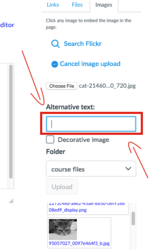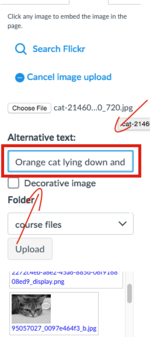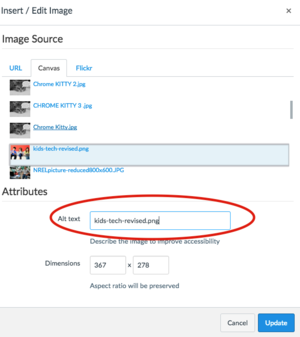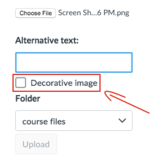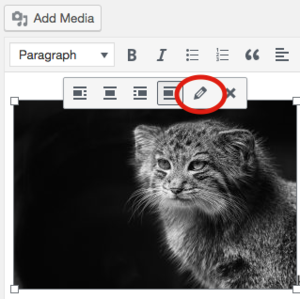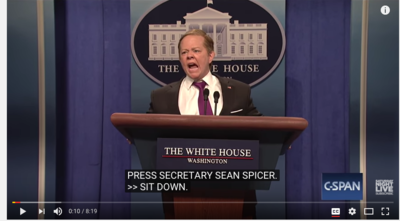Difference between revisions of "Alt Text and Captioning"
| Line 5: | Line 5: | ||
Alt Text (or "Alternative Text") provides text based descriptions of media content to aid users who are utilizing screen readers so that they can have a better understanding of and context for what that particular content is. | Alt Text (or "Alternative Text") provides text based descriptions of media content to aid users who are utilizing screen readers so that they can have a better understanding of and context for what that particular content is. | ||
| + | ===Alt Text in Canvas=== | ||
| + | |||
| + | You can upload files to your Canvas site from two locations, the Sidebar, and the Canvas File page. Both options provide you with a space to insert Alt text to describe the content you wish to upload for screen readers. | ||
====Adding Alt Text From the Sidebar==== | ====Adding Alt Text From the Sidebar==== | ||
Revision as of 15:38, 8 May 2018
Why and where to insert Alt Text in your Web Based Content.
Alt Text
Alt Text (or "Alternative Text") provides text based descriptions of media content to aid users who are utilizing screen readers so that they can have a better understanding of and context for what that particular content is.
Alt Text in Canvas
You can upload files to your Canvas site from two locations, the Sidebar, and the Canvas File page. Both options provide you with a space to insert Alt text to describe the content you wish to upload for screen readers.
Adding Alt Text From the Sidebar
From the sidebar's Image tab you can upload image files from your computer and add Alt Text to those images when you are editing or creating content.
Unlike embedding an image from the Embed Image button in the text editor or uploading a file from your Canvas Files, when you upload a file directly from your computer files from the Image tab in the sidebar, Canvas will not automatically generate Alt Text for that Image. So it is important to add descriptive Alt Text.
Alt Text From the Canvas File Page
Canvas provides a place to include alt text, but you will need to enter it manually.
Default Alt Text (name of the image) Canvas automatically populates the "Alt text" field for an image with the name of the file as the alternative text, but this is not the correct practice for providing alt text for an image.
For instance, the file name of the image below is kids-tech-revised.jpg, which Canvas automatically enters in the Alt text field.
It is important to change the automated alt text to text which better describes the image. This will provide users who are utilizing screen readers a better understanding of and context for what that particular media content is.
An example of appropriate Alt text: One boy and two girls sitting on a couch with a smartphone, tablet, and laptop.
Decorative Images
A Decorative Image is generally an unimportant graphic or design used only to embellish the page. If you think the image you are uploading is for decorative purposes only, check the Decorative Image box. This will allow those who are using screen readers to know it is for decoration only.
Alt Text in WordPress
Add alternative (Alt) text to images.
- In the Page or Post, click on the image once to highlight it.
- From the pop-up mini-menu, click on the Edit (pencil icon) button
- At the Image Details page, enter a description of the image in the Alternative Text field
- Click the blue Update button in the lower right corner to save.
An example of appropriate Alt Text: An image of a Pallas Cat in black, white, and grey.
Video Captioning
Make sure that the video you link to or create includes captions or a transcript of the audio to assist screen readers.
To check if the YouTube video includes captioning, check the lower right-hand side of the screen for the CC icon.
NOTE: Make sure you check the accuracy of the captions on YouTube before you upload it to your site. YouTube includes automated captioning which can often be inaccurate in comparison to the actual audio.

